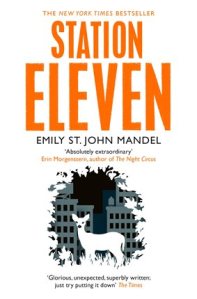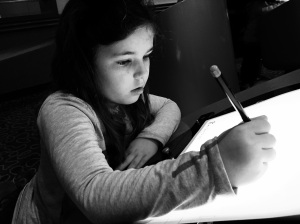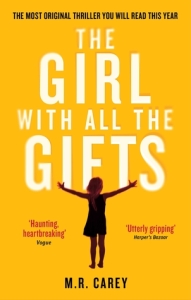The Girl with all the Gifts
(I’ll try not to reveal too much in this review, but there’s probably spoilers in here. I read a spoiler before I read the book and it didn’t damage my enjoyment though… In fact knowing the early “twist” helped me make sense of the initial chapters and might have increased my enjoyment…)
Zombies. Zombies. Zombies.
Zombies, everywhere! While Twilight brought in a vampire fad for a time, The Walking Dead has brought zombies back to the mainstream with a gory vengence!
Of course, for those interested in comics and all things geeky, zombies are a constant meme running through culture. Similar to the fascinating and recurring debate on “When is a strawberry dead?” (on the great BBC radio 4 show The Infinite Monkey Cage), zombies make us confront two things: the very nature of death and, in particular, death of the individual (the soul?) and the issue of… THE APOCALYPSE!
I wrote a little about the apocalypse in my review of Station Eleven. Suffice it to say, that the theme lets writers address aspects of human existence with the training wheels of society taken off.
In the case of this book (which is intelligent, thrilling, pacy and a VERY GOOD READ) the theme is it addresses is humanity or, more precisely, when does humanity start and when does it end?
The author, M R Carey, is a seasoned comic book writer, and it shows. I’m a seasoned comic book reader and I can see this book in a very visual way. Many of the themes and archetypes addressed in it are standard comic book/ geek culture tropes.
The Junkers. The characters (all, at least initially, stereotypes). The zombies. The landscape. All very very standard.
But this book isn’t standard. About 6 chapters in I feared it would be. But it isn’t. Here’s what sets it apart:
Melanie. She’s great. She’s an intelligent kid with self awareness but she always feels like a kid. This connection to childhood is maintained through her devotion to her teacher. Melanie is fully realised and the big reveal at the end makes so much sense not only because of a cyclical “ah!” moment, but also the emotional sense it makes to the book’s best and most central character, Melanie.
The explanation. Sometimes I like it when apocalyptic tales DON’T explain the BIG BAD REASON (eg: Y The Last Man) but when it’s done well (scientific enough to be reasonable and not enough to be unintelligible) it adds a whole sub layer of depth and pathos. M R Carey does it so well here. The reasoning explains Melanie. It explains each character’s motivations. And it explains and illuminates the ending.
The big shift in pace. For a brief time near the beginning I was worried that the book might lack pace. I loved the start, but there was a moment when I was concerned that the book would be confined to … well the confinement area. Then the big attack and, like a conductor downing a Red Bull, the tempo bursts forth and doesn’t stop. It doesn’t stop until the ending, which drops the pace to a soft calm inevitable dream-like climax which feels, after the read, the only and most complete end.
This is a book written by someone at ease with fiction, comics, quality TV and popular culture (M R Carey wrote the screenplay adaptation for this at the same time as the novel). It’s the perfect book for someone looking for a very well-written, well-paced and well-populated novel. It has a hefty mix of quasi-scientific ideas, emotional resonance and a plot that storms along like Snowpiercer.
Buy it. Read it. Wait for the movie.
Station Eleven
 So. This is the book that I chose to start my rediscovery of novels. For a while I thought I’d try and churn through some classics – Dickens, Waugh, etc – but, in truth, while I’ve always admired those books, I’ve never truly enjoyed them. I don’t get Shakespeare. Or Chaucer. I understand that what we have flows from them, just like I understand that the overarching stories and themes of The Wire are thanks to the groundbreaking work of Hill St Blues, but I want to read what’s NOW.
So. This is the book that I chose to start my rediscovery of novels. For a while I thought I’d try and churn through some classics – Dickens, Waugh, etc – but, in truth, while I’ve always admired those books, I’ve never truly enjoyed them. I don’t get Shakespeare. Or Chaucer. I understand that what we have flows from them, just like I understand that the overarching stories and themes of The Wire are thanks to the groundbreaking work of Hill St Blues, but I want to read what’s NOW.
I wasn’t always like this. I remember being in school (Year 10 or 11 I think) and reading Pride and Prejudice. This wasn’t a set text, you understand. I was reading it for pleasure. Or was that for pretence? Did I enjoy it? Or did I enjoy the thought of myself enjoying it? No! Not for me now the perpetual looking-over-my-shoulder for approval of whether this or that novel is VALID. No! The new me… my new journey would be about embracing a BLOODY GOOD STORY. A BLOODY GOOD READ.
I’m not sure how I came to Station Eleven. I suspect Amazon was to blame in some way with its recommendations or maybe I read a review somewhere. Anyhow. I clicked and lo! it was sent, arriving in its cardboard coffin, reading to be torn and reborn!
I liked this book. I’m not fully buying into the splurges and splurges of praise its receiving, but I liked it. I admired it, but there were times when I slogged through the text. That’s probably unfair. All of the text was beautifully written.
Let’s take a step back.
I like apocalyptic tales. For me The End of the World does something crucial. Roald Dahl once said that in all of his books one of the first things he has to do is remove the parental figures otherwise his heroes (who are mostly children) would, quite rightly, go straight to them for help. Roald Dahl had some great ways of disposing of parents (charged by a rhino???) and it’s not just him. Think about other children’s stories and you’ll see that, in some way, the parental figures have to be incapacitated. Harry Potter?
The apocalypse functions in a similar way. Suddenly all the support mechanisms are gone. The police. The government. And – that killer of many a modern story – the mobile phone. Therefore you are able to tell a very precise story about very precise motivations and human traits.
Think of The Road, which focused on the collapse of human civility writ large, but the ability of individuals to maintain some sort of connection. It was like the flickerings of hope in a dark whirlwind.
Well, Station Eleven toys with similar themes but in a less dark way. Because the book is set twenty years after the apocalypse, much of the truly terrible deeds are done. Now is the job of sparking up civilisation again. I liked that. It was an intriguing and well written approach. I liked the characters too. They all seemed genuinely motivated and all seemed genuine.
What I didn’t like? This is just me, you understand. But I just didn’t get the need for the connections. There were times when the novel moved back in time and I sort of groaned. I wasn’t that interested in the failings or otherwise of a Hollywood actor. I sort of enjoyed those parts of the novel as I read them but I wasn’t swept along.
Here’s it for me: The various strands of the story, I don’t think, are individually strong enough to stand alone. If I’d read any of them seperately I’d have thought they were satisfying short stories. So if the individual strands weren’t hugely compelling to me, then how they are weaved together is vital. And they were weaved together but sometimes a little too tightly (the reveal of the big baddy) and too loosely at other times (two characters/stories that you really want to meet never do… and end up miles and miles apart!)).
But here’s the thing. I enjoyed reading the book. I wasn’t wowed by it as I read it but I enjoyed it. But afterwards I had a nagging thought. Several nagging thoughts. Somehow some of those characters that were left unresolved and some of those plot points left dangling, they just kept buzzing at my mind. And that’s a good book. Or, at least, a good story.
A new start
I haven’t been able to find time recently for reading. I used to love it… I spent many an hour churning through novel after novel; but in the last few years TV has taken over. It’s all been good TV (Breaking Bad, House of Cards, Battlestar Galactica etc) but it’s been TV none-the-less. Recently I made the decision to read more. Again.
And the last three novels I read – the first three novels in my new reading drive! – just happened to be amazing. They succeeded in showing me what I already knew – that the novel is the purest, the best form of story telling. Whilst I will still watch TV (and I still think that’s a fantastic story-telling medium which, right now, is achieving something close to perfection in its understanding of form and craft) I am determined to re-embrace the novel.
And, like any re-born evangelist, I want to shout about my hallelujah moment. Hence this blog. This blog is initially designed to be a record of the books I’ve read with maybe a little reviewing and critique in there somewhere. If you stumble across this blog, welcome and please make any comments you want or contact me.
Thanks for stopping by.

